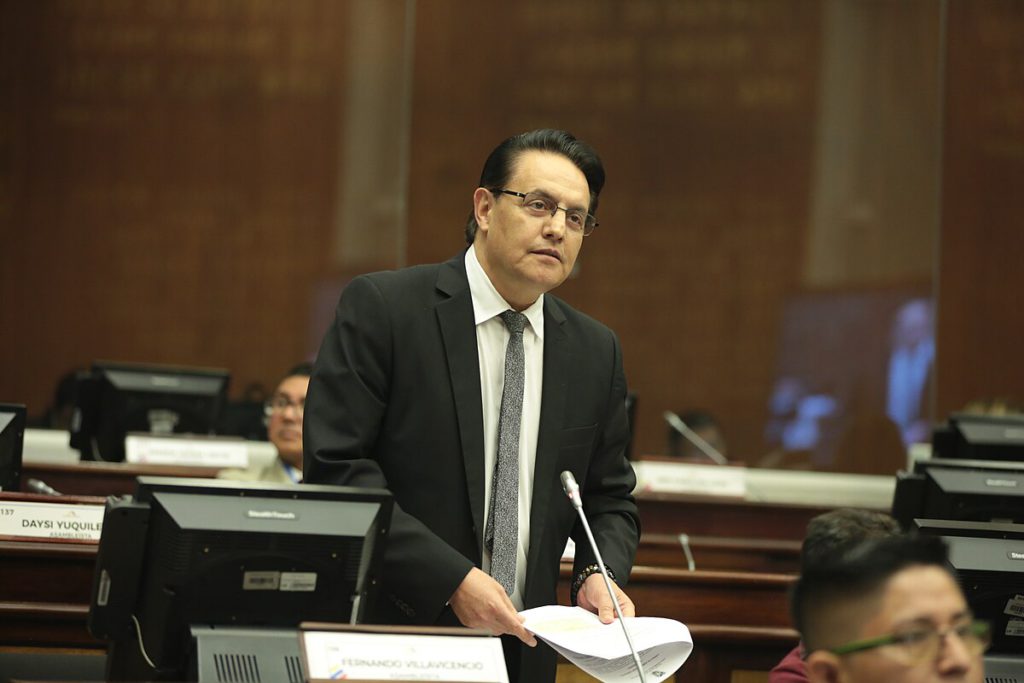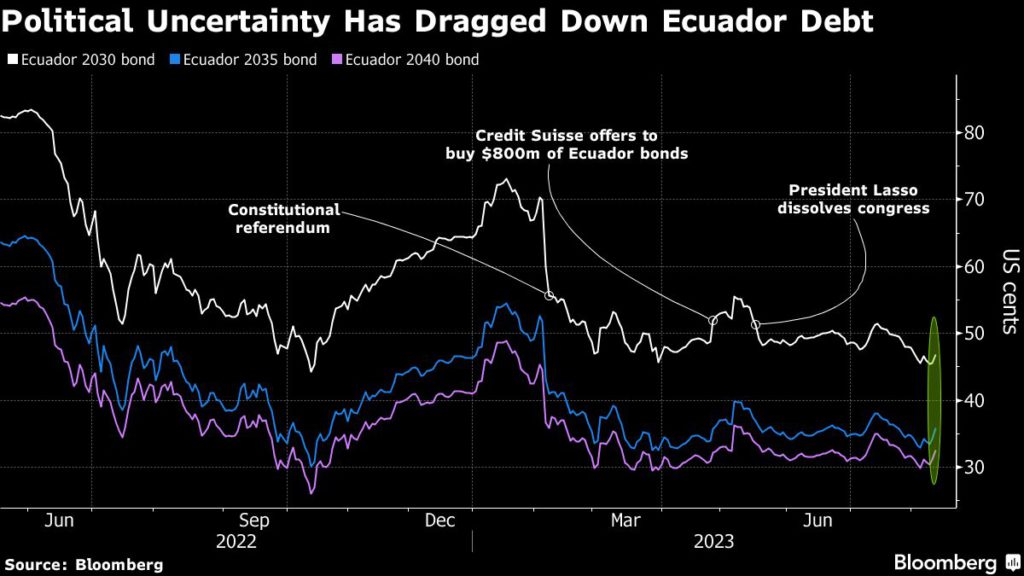Assassination in Ecuador spurs investor rethink of elections

As Ecuador grapples with the fallout from the shocking assassination of a top presidential contender, investors are weighing how the tragedy will influence the outcome of the upcoming election.
The killing of Fernando Villavicencio, an anti-graft crusader who was seen as one of the candidates with the best odds of advancing in the presidential race, stands to boost the chances of one of the more conservative challengers against socialist Luisa Gonzalez in the Aug. 20 vote. The possibility led to a jump in the price of Ecuador bonds, which have traded for over a year now at levels that indicate investors believe there’s a high probability of default. The Thursday gains were the biggest since May, and the best in emerging markets on the day.
“This potentially makes a market-friendly candidate more competitive against Gonzalez in the runoff,” said Carlos de Sousa, emerging-markets money manager at Vontobel Asset Management AG in Zurich.
Gonzalez’s center-right competitor Otto Sonnenholzner or Jan Topic, known for his hard-line approach to growing security issues, could pick up votes in the wake of Villavicencio’s murder, de Sousa said. That would in turn increase the chances that there will have to be a run-off vote to decide the winner, an outcome that could work against Gonzalez, a candidate backed by former President Rafael Correa who unnerves investors with her talk of boosting spending on welfare and public works.

Villavicencio, a former reporter, was murdered while leaving a political rally at a school in the capital city of Quito late on Wednesday. Warring cocaine cartels have turned the once-peaceful country into one of the most violent places in the world, making law and order central in the campaigns.
The killing adds to the pressures on a country already reeling from months of political uncertainty after voters rejected referendum proposals and opponents mounted an impeachment campaign against President Guillermo Lasso, prompting him to close congress and trigger a snap vote.
The government’s dollar bonds are among the worst performers in emerging markets this year, losing more than 25%, even after Thursday’s gains.
“Undoubtedly it’s set back for the country, set back for democracy, set back for the institutions in Ecuador,” said Paul Greer, a money manager at Fidelity Investment Management in London.
Ecuador has a checkered financial history. Since its independence, it has defaulted on its external debt 11 times, most recently at the onset of the coronavirus pandemic. While the investment scenario improved under Lasso, with international reserves near record highs, minimal debt service payments and a narrowing fiscal deficit, the return of a hard left administration could upend the outlook for markets.
Gonzalez, who has been leading in polls, is an ex-lawmaker who represents the party of former leftist President Correa, who stopped paying overseas debt in 2008 and called creditors “true monsters.”
Correismo — as the former president’s political philosophy is known — may be weakened in the wake of the killing, giving a boost to the bonds in the short term, said Siobhan Morden, managing director Latin America fixed income strategy at Santander US.
As of 3:30 p.m. in New York, notes due in 2035 rose 1.5 cent to 35.7 cents on the dollar, while debt maturing in 2040 rose 1.4 cents to 32.5 cents on the dollar — the biggest advances since early May — according to indicative pricing compiled by Bloomberg.
“This is a stark reminder of the sustained degradation in governance, justice, and security in the country, which will take front seat in the policy agenda going forward,” EMFI Group analysts Gerónimo Mansutti Silva, Valeria Garcés Padilla and Guillermo Guerrero wrote in a Thursday note.
The killing could also diminish the chances for Indigenous leader Yaku Perez, since his campaign focused on water, hydrocarbon and mining issues as opposed to security and corruption, according to Nathalie Marshik, a managing director for fixed income at BNP Paribas.
Investors are now mulling which candidate is likely to challenge Gonzalez, but uncertainty is still high, said Fernando Losada, managing director at Oppenheimer & Co.
“Some investors may be interpreting that the more moderate candidates have a better chance of performing well in the upcoming elections,” he said. “As the political climate is very rarefied, it is premature to reach such a conclusion. We maintain a cautious view of the credit.”
(By Maria Elena Vizcaino, Zijia Song and Ezra Fieser, with assistance from Netty Ismail and Philip Sanders)
Read More: Ecuador’s President asks court to resume environmental consultations
{{ commodity.name }}
{{ post.title }}
{{ post.date }}




Comments